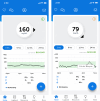Safety of a Novel Continuous Glucose Monitoring-Informed Insulin Bolus Calculator Mobile Application for People With Type 1 or Type 2 Diabetes
- PMID: 40386812
- PMCID: PMC12078995
- DOI: 10.2337/ds24-0032
Safety of a Novel Continuous Glucose Monitoring-Informed Insulin Bolus Calculator Mobile Application for People With Type 1 or Type 2 Diabetes
Abstract
Background: Managing bolus insulin dosing can be a significant burden for people with diabetes, many of whom have limited numeracy skills. Insulin bolus calculators (IBCs) may improve glycemia as well as treatment satisfaction.
Objective: The purpose of this study was to demonstrate the safety of a novel, continuous glucose monitoring (CGM)-informed IBC mobile device app that applies trend arrow adjustments to bolus insulin dose recommendations.
Research design and methods: This clinical trial was an open-label, industry-sponsored single-arm study conducted at two sites. Fifty-four participants with type 1 or type 2 diabetes were enrolled and used the IBC app on their mobile device for 30 days. Study participants were adults who were already using CGM and dosing bolus insulin. The analysis examined both noninferiority and superiority of time in range (TIR) during the study period compared with baseline. Other important end points included hypoglycemia, glucose variability, nocturnal and diurnal TIR, and diabetes distress. The per-protocol (PP) group was defined as participants who used the IBC >30 times during the study.
Results: Mean TIR improved by 3.8% (95% CI 0.7-6.9%) from 69.2 to 73.0% (P = 0.017) in the PP group. This TIR corresponds to a mean of 0.9 more hours per day spent in range, and the improvement was driven by those with type 2 diabetes. There was no increase in measures of hypoglycemia or diabetes distress. Exploratory analysis revealed a reduction in measures of glucose variability. In addition, individuals with type 1 diabetes had greater improvements in diurnal TIR than in nocturnal TIR.
Conclusion: A CGM-informed IBC app that applies trend arrow adjustments to bolus insulin dose recommendations improved TIR without increasing hypoglycemia or diabetes distress in individuals with type 1 or type 2 diabetes.
©2024 by the American Diabetes Association.
Conflict of interest statement
M.S., A.K., and A.I. are employees of Welldoc. G.A. has been a consultant for Dexcom, Insulet, and Medscape and has received research funding from Fractyl Laboratories, Insulet, and Tandem Diabetes. No other potential conflicts of interest relevant to this article were reported.
Figures

References
-
- Marden S, Thomas PW, Sheppard ZA, Knott J, Lueddeke J, Kerr D.. Poor numeracy skills are associated with glycaemic control in type 1 diabetes. Diabet Med 2012;29:662–669 - PubMed
LinkOut - more resources
Full Text Sources
Miscellaneous

